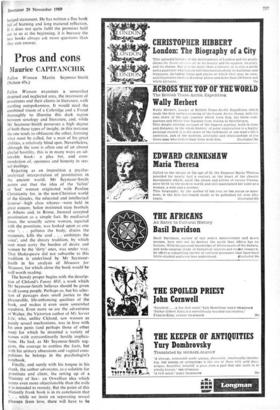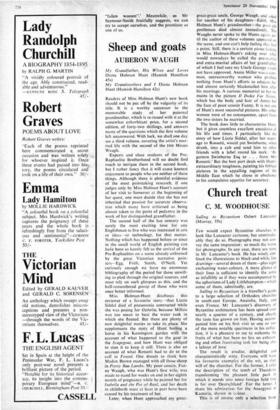Pros and cons
Maurice CAPITANCHIK
Fallen Women Martin Seymour-Smith (Nelson 45s.)
Fallen Women examines a somewhat despised and neglected area, the treatment of prostitutes and their clients in literature, with startling outspokenness. It would need the combined vision of a Coleridge and a Freud thoroughly to illumine this dark region between sexology and literature, and, while Mr Seymour-Smith possesses a high degree of both these types of insight, in this instance the one tends to obfuscate the other, forming what must be called, for a man of his great abilities, a relatively blind spot. Nevertheless, although the tone is often one of an almost gleeful hostility, this is in many ways an ad- mirable book : a plea for, and com- mendation of, openness and honesty in sex- ual dealings.
Rejecting as an imposition a psycho, analytical interpretation of prostitution in the ancient world, Mr Seymour-Smith points out that the idea of the 'fallen' or 'lost' woman originated with Pauline Christianity for, in the non-Christian world of the Greeks, the educated and intellectual Iletairai—high class whores—were held in great esteem; Solon instituted state brothels in Athens and, in Rome, Juvenal accepted prostitution as a simple fact. By mediaeval times, the sexually active woman, equated with the prostitute, was looked upon as one who `. . . pollutes the body, drains the resources, kills the soul . . . embitters the voice', and the dreary tradition, by which men must carry the burden of desire and women be the 'dirty' ones, was under way. That Shakespeare did not subscribe to this tradition is underlined by Mr Seymour- Smith in his analysis of Measure for Measure, for which alone the book would be well worth reading.
The bawdy proper begins with the descrip- tion of Cleland's Fanny Hill, a work which Mr Seymour-Smith believes should be given to all young people. Perhaps so, but his selec- tion of passages does small justice to the pleasurable, life-enhancing qualities of the book, and makes it even seem somewhat repulsive. Even more so are the adventures of Walter, the Victorian author of My Secret Life; who, unlike Cleland, saw women as purely sexual mechanisms, was in love with his own penis (and perhaps those of other men) for which he invented a variety of names with extraordinarily hostile implica- tions. He had, as Mr Seymour-Smith sug- gests, the courage to confess the facts, but with his urinary obsessions and vaginal com- pulsions he belongs in the psychologist's notebook.
Finally, and surely with his tongue in his cheek, the author advocates, as a solutidn for prostitute and client, the setting up of a Ministry of Sex : an Orwellian idea which seems even more objectionable than the evils it is intended to remedy. But the point of this blatantly frank book is in its conclusion that . while we insist on separating sexual Pleasure from love, there will have to be
"fallen women": Meanwhile, as Mr Seymour-Smith fruitfully suggests, we can try to accept ourselves, and the prostitute as one of us.











































 Previous page
Previous page